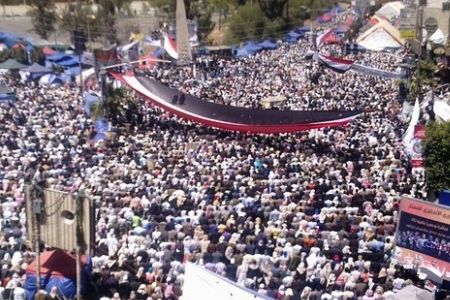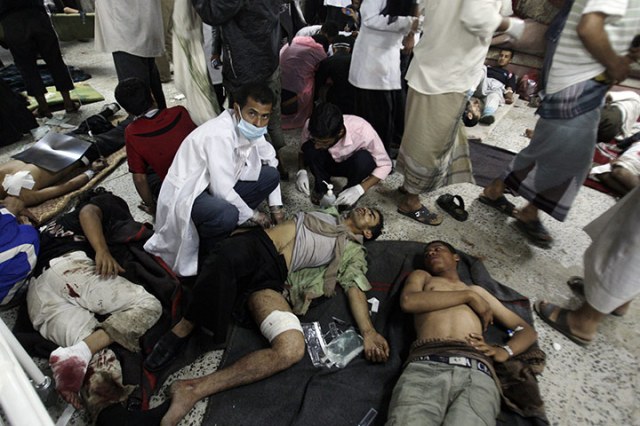The Real Revolutionaries
The Betrayed Masses
By: Hassan Al-Haifi
On February 24, 1994, a long lasting political crisis had put Yemen almost on a standstill for several months prior to that. This crisis arose three years after the most significant historical development in the history of modern Yemen, the reunification of Yemen, which was hence interrupted by British control of Aden and the surrounding Yemeni hinterland stretching from Bab Al-Mandab to Al-Mahara Governorate from 1839 and the subsequent brief independence of South Yemen granted in 1967. On that fateful day, in Amman, Jordan, all the factions party to this earlier political crisis got together to sign one of the most remarkable political settlements ever worked out, not just in the Yemeni context, but as a landmark political arrangement suitable for any state, especially in the region, which wishes to establish civilian democratic rule, relying on institutions, equal application of law, and participatory government at all levels. Ironically, many of those at that signing are also together in Riyadh now for the completion of the signing of the wishy – washy Gulf Cooperation Council (GCC) Initiative on the current political showdown in Yemen, albeit as factions, but many duly represented by different persons. The most obvious consistency is that of President Ali Abdullah Saleh [now ruling Yemen, with an iron fist for a third of a century (since 1978) still playing the role of the leading iconic personality in both instances].
The observer is not going to get into the details of this phenomenon, as the background information on the current fanfare is readily available under a quick search on the GCC Initiative in the internet. The two events are discussed here to point out that one should not expect this to be the finale of the political crisis brought on by an innocent peaceful youth revolution which started in Yemen in February 2011, similar to that of the earlier successful revolts that have taken place in Tunisia and Egypt. In fact, if the observer is not mistaken, the signing could be the signal that the Yemeni Revolution will mostly take on the same violent course the signing of the Pact of Agreement and Accord took 17 years earlier in Amman. Within four months of that historical moment, Yemen was embroiled in a violent civil conflict, which had been planned for by regional and perhaps international powers, and implemented by their loyal local factions in Yemen. Misleadingly called the War of Secession, the 1994 Civil War ended all hope of a modern state arising in Yemen for any foreseeable future. Now, with the signing of the GCC Initiative and its so called Implementation Mechanism, violence and maybe even war should not be ruled out as another course for the very same signing factions to pursue. Most of the signers are known war lords, and the so called opposition (Joint Meeting Parties or JMP Coalition) is not anywhere near capable of asserting whatever gains it may think it has earned by this flops of regional diplomacy, unbelievably reinforced by United Nations Security Council Resolution 2014 issued on 21 October 2011. Never have the international community worked diligently to legitimize some of the grossest human rights violations and horrendous corruption by rouge dictatorial regimes, as Yemen has undoubtedly been since Saleh took over. This was the case with this folly of uncalled for interference in Yemeni affairs dictated by some of the most despotic states in the world today, with the support of what were presumed to be staunch backers of democratic governments throughout the world.
For the youth of Yemen and the millions of Yemenis, who have come out to support their legitimate peaceful revolution, hard decisions will have to be made, and very quickly. Where do they go from here? The challenges facing them are enormous indeed Their revolt has been swindled by an ungracious opposition, without any mandate whatsoever to speak for them or sign on their behalf on an arrangement that amounts to no more than a coup d’état, or another extension of the dreaded Saleh Presidency blessed by the international community. Now Saleh can proceed by doing what he knows best, settling his political scores by the nozzles of tanks, the thunder of exploding scud missiles, the cruelty of his hired uncultured mercenary thugs interlaced with the Central Security Forces, National or Home Security Forces, Republican Guards, etc. all of which are STILL commanded by Saleh’s sons. What will the other factions do (Islah and other opposition parties, with only the Islah having any military weight to speak of, Ali Mohsen Al-Ahmar, the Hashid tribal chiefs, etc)? Only Crown Prince Nayif of Saudi Arabia knows for sure (Assuming now that he has taken over the Yemeni file from the late Prince Sultan, who held it successfully for fifty years hence, and eventually producing the miserable situation that Yemen is now facing). The latter will at least continue to dole out the dough that made all these war lords what they are today. Saudi Arabia could not look for a better situation, while they instill their hold on the newly gained territory Saleh gave them with the signing of the Border Agreement on June 12, 2000. The latter gave them full control of the Empty Quarter Desert, which is said to hold one of the largest oil reserves in the world, as well as other territory they could never dream of taking under normal sovereign conditions for Yemen. Most chroniclers attest to a third of the Desert, at least, really belonging to Yemen. Saudi Arabia is probably already pumping some 2 million barrels out of it per day, which before the signing KSA would not even touch. Never mind that now, we got a war in the making to which to pay attention. The observer prays that the latter is wrong.





